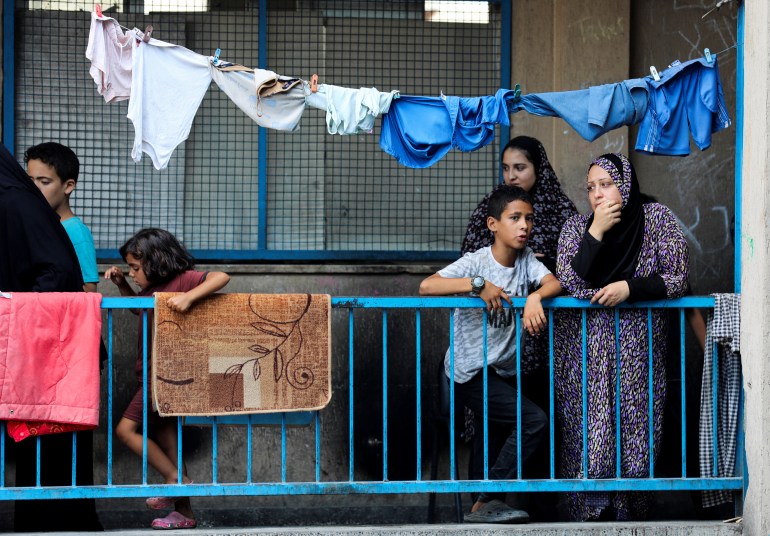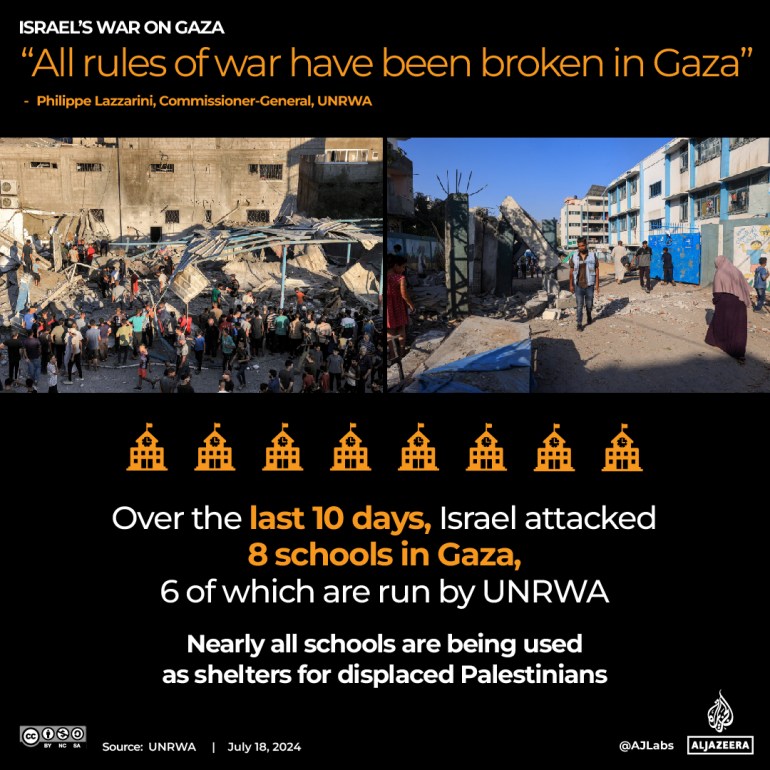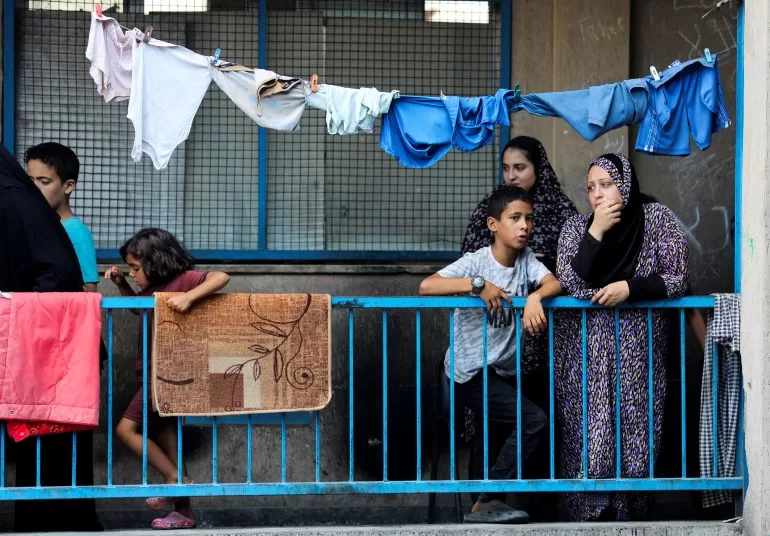At least eight United Nations-run schools serving as shelters to displaced Palestinians have been hit by Israeli attacks in the last 10 days.
The United Nations Relief and Works Agency (UNRWA) say 120 of their educational institutions have been hit since Israel began its war on Gaza on October 7.
Families living in disused classrooms face fatigue, trauma and the overcrowded and unsanitary conditions of shelters stretched far beyond capacity.
Despite the difficult conditions and the risk of bombardment, many seek out the relative safety of UN schools, some guided by the memory of past wars where these spaces provided a refuge, and since at least 2017, a couple were designed to double up as emergency shelters with additional power, sanitation and generator facilities.

Protection
“You hope that the UN affiliation might protect you,” said journalist Mohammed Mhawish, 25, who sheltered in a UN-run school in Gaza City with his wife, two-year-old child and his parents after an Israeli attack destroyed their home in December, trapping them under rubble for two hours until neighbours dug them free.
“You need to remember, there are few residential compounds, or anywhere else in Gaza where you can shelter,” he said, recalling how his neighbours had taken the injured family in after rescuing them.
It soon became clear the apartment was overcrowded. However, it was the further Israeli bombardment and land assault on their neighbourhood that forced his family to walk the one and a half hours to the nearest UN-run school, a 15-minute journey by car.
“It’s a central point. There’s nowhere else where you can access aid or medicine,” he said, speaking from Cairo where his family now lives. “To be clear, there isn’t a lot. Everything is in short supply. You seem to spend all your time standing in line for less and less, but it’s something.”
Mohammed added, that, “from a practical perspective, you can’t share what you don’t have. The more people in the school can also mean less food, water and medicine.”
In winter, blankets and mattresses were in short supply and they were forced to drink from a contaminated water source, increasing the risk of getting sick. And there was always the threat of bombardment.
“It was always there,” Mohammed recalled, “Nowhere was safe. People would simply sit and wait for it.”
Still, for some, there was a sense of support. “For some people, it’s good to be around other people who’ve been through the same kind of trauma,” he said. “People share their experiences with each other and that can help.”
But for Mohammad, it was unbearable to see how his son Rafik had been traumatised after the bombing they survived. “He stopped communicating. He wouldn’t cry. He wouldn’t show any emotion, there was nothing,” Mohammed recalled. “He stopped remembering how to be a kid.”
Then an Israeli evacuation order in January forced them to leave the school to find refuge in the garage of a destroyed apartment building.

Nine in every 10 people displaced
“People choose these schools because they believe sheltering under the UN flag, as international law states, should provide safety,” UNRWA’s senior communications officer Louise Wateridge told Al Jazeera from Gaza. “For civilians, the schools provide safety in times of war. Under the UN flag, these schools should be protected.”
However, the agency faces several challenges in getting supplies to people, even as they shelter in schools.
“Several factors continue to stand in our way to bring in humanitarian supplies into Gaza,” she said. “They include the siege, restrictions on movements and safety of humanitarian aid workers,” she explained, going on to stress the limited aid and equipment, much of it medical, allowed into Gaza by the Israeli military, as well as the unpredictability of life in a conflict zone where the schools’ occupants are regularly ordered to evacuate by the Israeli army and make their way to another area it designates a “safe zone”.
“People continue to be forcibly displaced,” Wateridge continued. “It’s estimated that nine in every 10 people in Gaza are displaced. Many of them have been displaced up to 10 times since the war started. Protracted forced displacement makes it very difficult for us to verify data and figures.”
In addition, Wateridge said, was “the breakdown of law and order as a result of nine months of horrific living conditions, war, hunger, siege and chaos,” she said. Humanitarian workers also report increasing instances of violence and gender-based violence within schools.
“Concerns are growing about the risk of cholera spreading, further deteriorating inhumane living conditions,” Wateridge added. “WHO [The World Health Organization] has registered a growing number of adults and children suffering from waterborne diseases, such as hepatitis A, diarrheal illnesses, skin conditions, and others.”
Psychological support
Ahmad Swais, a psychologist with international medical charity Doctors Without Borders, known by its French initials, MSF, has witnessed how gatherings of large numbers of people carry “a lot of suffering and different experiences.”
“This increases the negative psychological and social impact on the individuals,” he said speaking from Nasser Hospital in southern Gaza. “It increases the severity of psychological symptoms for the individual and for the families who are gathering in one place whether in schools or other shelters.”
The schools offer little respite or space for those who arrive traumatised or seriously injured from the fighting, Swais said. Many feel a sense of dehumanisation in the difficult conditions.
Children are the worst affected psychologically by the repeated displacements and the war. “There [are a] large number of children in urgent need of a psychological support programme. It is crucial to create a suitable environment for the children and a safer place to live and to preserve their dignity and basic humanity,” he said.
Still, despite the hardships, “These people living in shelters like UNRWA schools feel they are luckier than those living in plastic tents and sleeping on the sand.”
